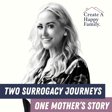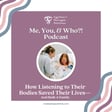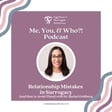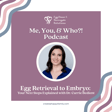Introduction to Kelly Johnson and Emotional Challenges in Infertility
00:00:00
Speaker
Hi everyone. Today's guest is someone who brings both professional expertise and genuine compassion to the surrogacy space. Kelly Johnson is a licensed clinical social worker and fertility counselor who has spent years walking alongside individuals and couples navigating infertility, loss, and the emotional complexities of family building.
00:00:21
Speaker
In our conversation, Kelly offers such a thoughtful perspective on what it really looks like to care for your emotional wellbeing during a surrogacy journey, whether you're just getting started or are already matched.
00:00:32
Speaker
We talk about how grief and hope can show up at the same time, why strong communication between surrogates and intended parents is so important and how support groups like the ones that are offered to intended parents at egg donor and surrogate solutions can make a big difference along the way.
00:00:50
Speaker
Kelly has a true gift for holding space and helping people feel seen in their experiences. And I'm so excited to share her insights with you today. Enjoy.
00:01:03
Speaker
me you, and who? Who knew it would take more than two people to have a baby in a world where infertility is no longer a taboo topic. This podcast will take you through all of the different aspects of surrogacy and egg donation through the lens of many who walk this journey in different ways.
Whitney Hall's Role as a Surrogacy Coordinator
00:01:23
Speaker
My name is Whitney Hall. i am a two time surrogate now turned surrogacy coordinator for egg donor and surrogate solutions. the very agency I used when I chose to carry for two amazing families. With this podcast, it is our goal to help guide and support you as you learn about what it takes to grow a family in an alternative way, as well as hear inspiring and beautiful stories of how this path has changed lives forever. We can't wait for you to hear about just one more way happy families are created every day.
00:01:59
Speaker
Well, Kelly, thank you so much for being here and doing this with us. I'm so excited. thank you so much for having me. Absolutely.
Kelly's Career Journey into Fertility Counseling
00:02:10
Speaker
okay, so before we get started, um well, actually just to, you know, right off the bat, um just share if you would a little bit about your background and what led you to focus your work on fertility and just third party reproduction.
00:02:26
Speaker
Yeah, so I've been a social worker for almost 10 years now. I've almost always worked in the medical realm to some extent. And then I really found my passion for just perinatal mental health, high risk pregnancies, infertilities, and infertility counseling. My heart has just always really been in helping people experiencing something really hard, whether it's like they got really hard news or the worst day of their lives and they're navigating something. Like I've always kind of wanted to be that support person.
00:02:56
Speaker
um And so through my work just in the hospital system, I really found that I loved like high risk pregnancies, working with people, navigating pregnancy decision making challenges, getting pregnant. And then i found myself working. i actually got the opportunity to work full time as a therapist built into a fertility clinic.
00:03:15
Speaker
and know Yeah. And so that's where I got just all the knowledge and training around specifically working with people using donor egg, donor sperm, donor embryo, gestational carrier, combination of some of those things.
00:03:29
Speaker
um And I really just love working in this realm. Yeah, no, for sure. It's amazing how um it's so wonderful to to have someone that is able to handle those big spaces like that. And I love that it is such a passant passion for you. you I know you've supported just obviously through your work at the hospital and then you know now i'm so many individuals and couples that are going through this process and you know just all in all of those different spaces and just different
00:04:01
Speaker
you know just different moments in
Emotional Themes for Intended Parents
00:04:05
Speaker
that. what ten What are kind of some of the emotional themes, I guess, that tend to show up most often, specifically for intended parents, um once maybe they've matched with a surrogate or have made kind of some of those you know big decisions, whether it's using a donor or just things like that?
00:04:25
Speaker
I think what I see so often are just themes of anxiety, ah feeling a sense of just loss of control. a grief and loss and not being able to carry their pregnancy for whatever reason, and really just grief and loss and some trauma and that their family building story may not be looking like they expected it to hoped it to look like. And there's so many emotional layers that come with that that I would say those emotions to some extent are present with almost all the intended parents that I work with.
00:05:00
Speaker
Can you maybe talk a little bit about how you know, hope and grief can kind of coexist side by side, maybe especially with parents who have experienced, you know, just loss, whether it's loss of how they thought their family building journey would go or, you know, even, you know, worst day of your life, child loss.
00:05:22
Speaker
Yeah. I think, I mean, all those forms of loss are so, so valid. And what I see so often, like you said, that hope and grief do coexist. And I always tell people, like, I know hope feels so vulnerable and so scary because that hope in some sense has been taken from them at some point in time or the sense of safety around pregnancy or family building has been taken from them.
00:05:47
Speaker
And so it's normal to struggle to hold on to hope. And people often say like, hope feels really scary and it's easier to just set myself up to expect the worst again because the worst has already happened to us.
00:06:00
Speaker
sure And so I really work with people on like balancing, how do we hold on to hope? And obviously you still have hope because you're in this process and you're making steps forward. um While also just acknowledging and recognizing the grief, the loss, the trauma, and that both of those things can work together and at parallel times.
00:06:20
Speaker
I love that phrase that you said that that sense of safety in family building. I don't think I've ever looked at.
00:06:31
Speaker
i don't think i've ever looked at the world in that way. There is kind of, i think, especially women, you kind of it almost feels like this is like a sure thing. You grow up with these, you know, fantasies of how it's all supposed to go. And it does feel safe when you're thinking about that.
00:06:46
Speaker
Yeah. And I think for so many women, and you know, in couples, it's just like so many times people spend so much time preventing pregnancy early on in their lives. And then they get to the point where we're like, we're ready for this. And then they experience infertility or pregnancy loss, miscarriages. I mean, and then it's kind of like, oh, what we thought this was going to look like isn't happening.
00:07:08
Speaker
And now I might not trust my body. so I don't feel safe in my own body to carry a pregnancy. Especially when couples have gotten negative pregnancy tests, had really hard pregnancy ultrasounds and losses, that this sense of safety in the process just altogether is now gone.
Trauma and Anxiety in Surrogacy
00:07:29
Speaker
that's where that trauma comes from, that even when people make the decision to switch paths to using a GC, that a lot of times intended parents are like, we're terrified to go to ultrasounds because every other ultrasound we've gone to, we've gotten bad news.
00:07:44
Speaker
Like this isn't as exciting anymore. It just, it feels scary. And so I think it just goes back to that trauma piece that's so interwoven in so many people's reproductive stories.
00:07:54
Speaker
For sure, for sure. and i know for me as a surrogate, i I remember kind of feeling that juxtaposition of, you know, oh, there's this happy, so exciting thing, like yay for that positive pregnancy test. And oh my goodness, anatomy scan, we're going get that adorable picture. And, you know, I had not experienced loss.
00:08:17
Speaker
So i I didn't know it from a personal level. I knew it just really from a knowledge level, like I guess. And i I think it was sometimes a little baffling, you know, before I really, really dug into this world.
00:08:30
Speaker
i'm you know, trying to understand why maybe, you know, intended mom might be, you know, oh yes, I'm happy about the positive pregnancy test, but I'm not gonna jump for joy at the moment.
00:08:43
Speaker
Right. I see that so, so often. And I think for GCs, it can be hard because they're like, this is so exciting. This is what we've been working towards. And a lot of times for intended parents, they may have gotten several positive pregnancy tests that then ended in a loss or ended some kind of really hard outcome. And so I feel like so often for intended parents are like,
00:09:05
Speaker
Yes, we're happy to get a positive pregnancy test, but also we're still kind of holding our breath and they can feel like until this baby's in our arms, like we're not going to be able to take a sigh of relief. And so I've seen a lot of times where intended parents might struggle to go to ultrasounds or connect with their GC because out of fear.
00:09:23
Speaker
And like, I'm just afraid that this is all going to be taken from us so that the rug's going to be ripped out from under us at any point in time. And so those emotions can definitely come up. I mean, even after matching.
00:09:36
Speaker
Sure. Absolutely. What are some ways that a surrogate can, you know, just support or make room for those types of emotions? Yeah. When I work with surrogates, i always try to just give some education on listen, like no matter what IP you're working with, they've gone through something in their reproductive journey to get to this point of needing to use a surrogate.
00:10:02
Speaker
So there probably is a baseline of anxiety or feeling like this lack of control. So that's why maybe you might feel like you're under the microscope at times. um Or they might feel your IPs might feel distant because they're struggling to connect with you or the pregnancy just out of the sense of grief and fear.
00:10:22
Speaker
So I always just like to provide a little bit of education just to give that insight as to like, hey, this is what it might be like for your IPs. And on the flip side, i do the same thing about, hey, this is what it might be like for your GC. For sure. And then where can we meet in the middle?
00:10:37
Speaker
Yeah, yeah, yeah. I think finding that middle, being able to understand their perspective, I think it it still can create... um i know at least it can make you just feel better about it right like oh i understand where that's coming from totally just that sense of empathy and understanding of like oh that makes sense maybe why they're feeling scared or not as excited to go into an ultrasound based on what they've been through sure absolutely so for the parents that you know again with with that trauma when you do get to those big moments
00:11:12
Speaker
positive pregnancy tests, viability, where you know that heartbeat confirmation, you know all of those things, um you know those can, like that does bring up, like you said, a lot of anxiety, um and especially for intended parents who have experienced some sort of loss.
00:11:29
Speaker
How do you help intended parents navigate those moments?
00:11:36
Speaker
really work with them on just kind of trying to reclaim some of these moments of quote unquote normalcy.
Reclaiming Normalcy for Intended Parents
00:11:42
Speaker
Yeah. in that, you know, if, for example, if it was really important to them to be able to surprise their friends and family with a pregnancy announcement, because that felt normal.
00:11:52
Speaker
It's like, then how can we do that? And how can we reclaim some of these significant moments that they can kind of rewrite their story based on where they're at, but still really holding onto these pieces that are important to them that we can still incorporate in the surrogacy journey.
00:12:07
Speaker
Oh, I love that. That's a great idea. Hey, we'll get right back to the show, but I wanted to take a quick moment to speak directly to those of you dreaming of growing your family.
00:12:19
Speaker
For the past 18 years, we at Egg Donor and Surrogate Solutions have had the privilege of walking alongside hopeful parents, guiding them through egg donation and surrogacy with empathy, expertise, and personal experience.
00:12:34
Speaker
Many of us on the team have been intended parents or surrogates or egg donors ourselves. So we understand just how important this journey is. Whether you're just starting to explore your options or ready to take the next step, we're here to help.
00:12:48
Speaker
You can schedule a free 15 minute call with our team at create a happy family dot com. to get your questions answered and see if we're the right fit for your journey. You don't have to figure this out alone.
00:12:59
Speaker
This is your invitation to learn more and take the next step toward the family you've been dreaming of. All right, let's get back to the show. What have been some of the fun pregnancy announcements that you've heard intended parents doing in this type of situation?
00:13:14
Speaker
I mean, even even separate from pregnancy announcements, I've had intended parents like celebrate transfer day by like during COVID times, I had a set of intended parents. They weren't allowed in the building for restrictions, but right they had like a parking lot party and like did like brought like snacks and breakfast and like made a whole thing out of it.
00:13:33
Speaker
It's just like a parking lot- Tailgate transfer. Yeah. And so it's just, it's kind of like, you know, how can we make these moments special even if there are, you know, other circumstances going on? So that was probably one of my favorites of how they're like, no, we're still celebrating this really big moment and like making a day out of it.
00:13:51
Speaker
I love it. I love it. Oh my gosh. That is so fun. For, so you know, again, kind of going back to this idea of, you know, those feelings coexisting, is there, you know, i I know sometimes maybe I've had experiences where, know,
00:14:07
Speaker
parents are, they're so afraid to be happy or they almost feel like, oh, if I don't, if if I do have a tailgate party, then um then that means I'm not acknowledging my grief. How can kind of those two coexist in kind of those happy moments?
00:14:25
Speaker
I think a piece of it is just, i always encourage people just like acknowledge what you're feeling. Like it's so much better to acknowledge these feelings of grief or loss than to sweep them under the rug. Cause they're going to come out at some point.
00:14:37
Speaker
So it's better to like let them come up in manageable pieces. Um, but a lot of work I do is just acknowledging like, this is your story and you can be, you know, so sad that this was your story up until this point.
00:14:49
Speaker
And, So excited that surrogacy was an opportunity for you to, you know, build your family. And so it's, it's kind of that example of like, you can absolutely be grieving, carrying a pregnancy and be so sad that this is your story while also thankful that surrogacy was even an option. And so it's kind of using that framework to honor their story, but
Building Connections Between Surrogates and Intended Parents
00:15:13
Speaker
also acknowledge like what is going well and what are we also thankful for in this moment?
00:15:19
Speaker
I love that. I love that. That's so beautiful. Again, just though this whole idea of co of co-existing and having all of these things all at once, which I mean, can be overwhelming, but you know, just focus on it one little bit at time. Yeah, absolutely. Absolutely.
00:15:34
Speaker
i love it. I love it. So going to kind of that connection piece with, you know, intended parents and their surrogate, What do you, you know, if they're wanting to, I i know I've had a lot of parents, um they're almost, they're unsure.
00:15:52
Speaker
They're worried that they're not doing, you know, quote, doing it right or or things like that. How, what do you kind of recommend like for intended parents whenever, you know, they're wanting to ah build that emotional connection with their surrogate in this process?
00:16:07
Speaker
I've seen so many times in working with both surrogates and intended parents that both are like, well, I don't want to be like too much, or I don't want to like step on their toes. And so then, then lot of times. Everyone's so nice to each other. Yeah.
00:16:19
Speaker
And I always tell people like, you know, if it feels right after match, like start just having just those conversations of just, you know, how are you? And it doesn't need to be surrogacy or pregnancy related. it can just be check-ins of like, Hey, how's the process going for you so far?
00:16:34
Speaker
Just to really build that foundation. Because I think people are so scared of what if this falls through or what if I come off as micromanaging my surrogate or if the surrogate's like, what if I'm giving too many updates?
00:16:46
Speaker
But what I always tell intended parents is that pretty much every surrogate that I've ever worked with, wants them to be involved in the pregnancy. Like they they're sharing this experience in this journey with them.
00:16:59
Speaker
And I feel like so many surrogates are so altruistic that like they get that fulfillment from like seeing the parents involvement, seeing their joy, seeing their happiness, helping them become parents. And so that's a big piece of it. And so I think part of it's kind of like jumping in and having some trust in the process and making those connections.
00:17:20
Speaker
Yeah, for sure. i love that advice of, especially in the beginning, right? Cause you know, there's, there's paperwork that you're doing and like, there's not, it's not like the fun pregnancy stuff yet. Like there's just kind of a lot of like check boxes that you're going through. And that's such a great opportunity to just start working on just that friendship. Like you said, Hey, how's it going? And you know, what's for dinner tonight or, you know, what whatever it may be.
00:17:44
Speaker
And, yeah and Like if you end up to be in the same state or if your surrogate's being evaluated at your home clinic, like those are all really great opportunities to also be like, hey, can we meet up for breakfast before the appointments or just like having those connection points along the way just to build that foundation.
00:18:03
Speaker
Yeah. What advice maybe would you give for navigating, you know, as you're getting to know each other and just maybe navigating some of those emotional boundaries with a intended parent and a surrogate?
00:18:19
Speaker
I tend to encourage people that if something's not feeling right with communication, like for example, if you feel like your surrogates not giving you enough updates and you're hoping for more, or if you're a surrogate and you're like, I sent this update and they like sent me back the thumbs up emoji and that didn't feel good. Cause it just didn't feel like much of a response.
00:18:38
Speaker
Um, or if the surrogates like, I feel like they're asking me what I'm eating and what I'm doing at all times of the day. Like i also need them to trust me. Like they those are some common things that feel like come up.
00:18:48
Speaker
yeah And I think it's always better to address it if you can sooner than later, because this is a longer term relationship. And so if Someone's feeling like communication isn't going how they're wanting it to like, it is so, so worth addressing.
00:19:04
Speaker
And this is where you also use your agency. If you don't feel comfortable addressing it or you did address it and it didn't change, that's where you loop in the agency because they can so much be that middleman for like, okay, what's going on How can we make this work? How can we mend this relationship?
00:19:21
Speaker
sha Because I think, you know, ideally no issues would come up in the relationship, but that might not be realistic all the time. Right. yeah And so I think it's just important to address as it comes up instead of letting it kind of simmer and then be a bigger issue later on.
00:19:36
Speaker
For sure. For sure. Absolutely. Yeah. Because the thumbs up could have just been, oh, they were really busy in that very moment and they're going to text you later that night. Or, you know, you're not feeling like you're getting enough updates, but let's get to the deeper part of that. There's just, there's not always a whole lot going on in certain times during pregnancy or yeah.
00:19:56
Speaker
Yeah, exactly. Sure. For sure. So think it's just about communicating from each party, like what you need and what communication feels good and what at what cadence does that feel good to? um Yeah. Yeah.
00:20:09
Speaker
Do you I feel like too, if you when you start kind of that early part of the relationship at the beginning, and it is kind of building more of a friendship versus just focusing on just the surrogate intended parent goal of having, you know, the baby,
00:20:27
Speaker
im not only does it build it trust build that trust, but then as maybe, like you said, kind of that cadence morphs and flows, it feels a little more natural and you can bring things up in a not worrisome way, I guess.
00:20:43
Speaker
yeah I think, and that's where, you know, if you have that foundation of a relationship to some extent, it is easier to bring up harder topics or to navigate some of those conflicts that might come up. And so I think it, no matter what that relationship ends up looking like, it always is beneficial to at least just have that foundation of good communication. Yeah, for sure. for sure.
00:21:07
Speaker
What maybe strategies you know, grounding tools would you recommend for maybe someone who is kind of having, just carrying an extra emotional weight when they're on this journey?
The Importance of Emotional Support and Support Groups
00:21:22
Speaker
I mean, first and foremost, I think connecting to a fertility therapist just to have your own space to process this because feelings can absolutely change throughout the surrogacy journey. And one moment you might think that you're okay and that this was the path that you're on. And then other moments you might be in a puddle of tears.
00:21:41
Speaker
yeah And that it's really hard. And just knowing that the emotions with it can come and go. And it doesn't mean that you're taking steps backwards in your emotional healing journey. It just, it's so normal for those to come and go. And so I can't say enough about connecting to a qualified fertility therapist who truly specializes in surrogacy, donor conception, fertility counseling, like truly, truly having that specialty is absolutely key.
00:22:10
Speaker
Yeah, absolutely. For maybe some like in the moment you're, you're getting ready to go to transfer day or you're waiting to, you know, maybe that, that 10 days between, you know, transfer and beta or, you know, things like that.
00:22:29
Speaker
What would you maybe recommend, you know, just little, little things that an intended parent or sir get you during, well, I would say, yeah, during those kind of anxious times, I guess.
00:22:42
Speaker
Yeah. I mean, I think we all recognize that there are much more anxious times in this process, like transfer day, the next nine or 10 day wait, like waiting for an ultrasound. We know anxiety is high.
00:22:53
Speaker
um So I encourage people, whether it's parents or surrogates, to really use that time to pencil in 30 minutes a day of self-care of something that brings them joy, happiness, relaxation, comfort, and just being so intentional, knowing that this is a high stress time.
00:23:13
Speaker
And what do I need to do right now to take care of myself? Because the more that we do those things, the more that if we do need to cope with something that comes up, we're better able to handle it. And so whether it's, you know, I think it's a great thing to do for surrogates, for parents and any kind of waiting periods.
00:23:30
Speaker
I think that that can just be so, so helpful. Yeah, for sure. What do you feel like is maybe, you know, we kind of know about those like high anxiety points.
00:23:43
Speaker
Do you feel like there's anything that's maybe overlooked during a surrogacy journey? I, you know, I think where I often see a lot of anxiety or pieces of control that try to come out is either in the legal process or after they've gotten through legal.
00:24:02
Speaker
oh I think that's one that I think is often overlooked and because it's like, oh, well, we're just to nervous risk for the transfer or those you know moments that we think about.
00:24:13
Speaker
um But I think it can be the day to day moments of like, you know maybe i would be choosing to eat all organic food if i was carrying my own pregnancy and like i wonder if my gc i wonder if she ate mcdonald's today or i wonder if she ate good today i think it can also be those like in between moments where you're like what is she doing how is she taking care of her body and our baby that can really present themselves and just need to be addressed sooner than later so that the ips can experience you know, some sense of reduced anxiety, build trust with the GC and so that the GC also feels like the intended parents are trusting.
00:24:51
Speaker
Sure. No, absolutely. And I feel like those, those little moments, those little one-offs, you know, that just kind of creep up and pop um, are, or why exactly like you said, it is so important to have some sort of,
00:25:09
Speaker
support, whether it be your friend, a family member, um or it's a you know qualified therapist in you know this space.
00:25:20
Speaker
So one of the things that is so cool is that you are leading um our support groups here with egg donor and surrogate solutions for intended parents. Why is the support group like that?
00:25:34
Speaker
know we've kind of touched on it, but why do you think something versus individual therapy, but having more of a support group of intended parents is so important. Yeah, so I absolutely love both. And I think the combination of both can be super helpful.
00:25:49
Speaker
um I will say our first support group a couple of weeks ago was so successful and I feel like it was just so, so meaningful. um But I think the support group format is really helpful. I know there's there are a lot of like general infertility support groups out there that people can join online. But I think what I found with those is that they're not surrogacy or donor conception specific.
00:26:12
Speaker
So you might be in the support group with someone who's like doing their first IUI and you're like, I've done eight IVF cycles and I'm now using a certain, like it just feels different. i And so I think having the space where you have a small community of people um that truly just get it, that their story leading up to surrogacy,
00:26:31
Speaker
was probably different than yours. But at the heart of it, you still have that shared experience of making that decision to use a surrogate, navigating a relationship with a surrogate. What does it feel like during pregnancy? And I can't tell you how many support groups I've run that people are like, someone will say something and they're like, oh my gosh, like, it's so nice to know that I'm not the only one that feels that way.
00:26:56
Speaker
And then people share tips and tricks like, hey, this is how we navigated ah communication issue with RGC. And this is what was really helpful for us. And so it's also kind of a great way for people to resource with each other and like, hey, what worked well for you?
00:27:10
Speaker
Is that something i can try? or hey, how did you manage anxiety going into the ultrasound? um So I think it's just a really great shared experience space where people can truly find anxiety.
00:27:22
Speaker
the meaningful connections because so often people are like, well, I don't know anyone else in my life who's used to circuit or has used to donor and they feel so isolated. and so I think at its root, the support group really, really helps reduce that isolation.
00:27:37
Speaker
I was going to say, i the number one theme, I think, in infertility is everyone feels like they're the only one doing it. And like the only one that is you know having issues with infertility or using a surrogate or using a donor.
00:27:52
Speaker
And I'm like, you guys, this world is way bigger than you think. And yet everyone feels so, like you said, isolated. Mm-hmm. Yeah, and no one, i think people are afraid to talk about it just in our general society. And I think what I found in these support groups is that people feel like it is a safe space to share. you know, I'm feeling maybe jealous that my surrogate's getting to carry the pregnancy and I'm not. And so it's been hard to go to ultrasounds or i'm really grieving not carrying a pregnancy. And so I think it's such a good space to talk about those really hard topics that other people just might not get.
00:28:30
Speaker
And I think especially for intended parents who might not be sharing this with people in their lives yet or waiting to share, it can be a really safe space to talk about like, hey, my GC did just get a positive pregnancy test. And yes, we're excited, but we're also scared and we're not sharing it with anyone yet. But that group is that space to share it.
00:28:49
Speaker
And so it just really provides just that safe space for emotional vulnerability and connection. I love that. For anyone who's maybe hesitating, what might you say to to them about the value of being a part of something like this?
00:29:08
Speaker
I think when people initially hear like joining a support group, it can feel intimidating and I absolutely get that. But I think that most people walk away from the group being like, that was so helpful, even just to log on and see there's three other people on this screen that simply just get it. Like there's other people using a surrogate and or a donor.
00:29:27
Speaker
um and so I think that there's some comfort in that and it's really informal. I make the group so that the people attending group get what they need to get out of it. And so. We really kind of whatever people are bringing up, we share about that. If they've had a hard week, we talk about that and other people kind of jump into. And so it's really an informal space and professionally led, which I think is also really important.
00:29:54
Speaker
Just and we talk about tips and tricks for communication, managing anxiety so that you also have that toolbox of things that you can use outside of groups. So I would tell people, give it a try and see what you think.
00:30:07
Speaker
There's something so beautiful. I mean, you know, again, it's just, it's so beautiful having other people that are in the same spot you are, or they have been in the spot that you are and you're able to get knowledge from them. and you know, it's different than talking to, you know, your, your girlfriend or your family member who has no idea where you're coming from. And all they can do is just kind of smile and nod and encourage as best they can.
00:30:34
Speaker
and Yeah, absolutely. I think just having that community of people that simply just get it. And the groups tend to be on the smaller side. So it is more of an intimate environment where people can truly share like, this is what's been going on, or this is what we've been struggling with. Like, what have other people done in this situation? And it's not necessarily like the overwhelming positivity that sometimes our friends and family give us of just wanting to make it better. And instead it's like, no, like let's talk about these hard feelings and really acknowledge what's coming up.
00:31:05
Speaker
m I love that. I love that there is a place because again, you know, our, our family and friends, they mean well, but sometimes you do just want to say, no, today just really sucked. And I just, I don't need any toxic positivity or any platitudes right now. I just need someone to say, yeah, today really sucked.
00:31:23
Speaker
Exactly. Exactly. And I think the group is a great space for that, for people just be like, yeah, this is hard. Like this isn't always easy. Yeah, for sure. Looking back on maybe some of the, you know, just just people and families that you have supported. Is there a moment or a story that, you know, just reminds you of maybe why this type of work just matters so deeply and what like just what gets you to just keep going?
00:31:53
Speaker
I think when i get the baby announcements, when I've worked with you know, on their journey for so long. um And it's just been such an honor to like walk with them on this journey. And then, you know, I've been with them on the good days, the bad days, everything in between. And then they share this birth announcement and it's like, this is why we do what we do. What, what do you maybe hope every intended parent takes away about just the importance of caring for their mental and emotional wellbeing during ah journey like this?
00:32:28
Speaker
I would say that now is such a good time to let yourself feel those feelings of grief and loss processes and therapy, connect to a support group, connect with someone else who has gone through surrogacy.
00:32:40
Speaker
um Because the more that we process these feelings now, the less likely they are to come up after your baby is born. So, because so many times people feel a sense of like shame or self blame or guilt in not being able to carry their pregnancy for whatever reason. and if we don't acknowledge and try to process those, they might come out when your baby is born. And so now is such a good time to just process all of this that's coming up.
00:33:10
Speaker
Yeah, absolutely. And, you know, again, support groups like this, Having individual counseling or therapy is a great avenue.
00:33:21
Speaker
Really, like you said, just that trusted support in someone to work through those those feelings and emotions as they arise. Exactly. Like now is the time to build your support network, whatever that looks like. Try a support group.
00:33:36
Speaker
Find what works for you so that you can build that sense of community as you navigate the surrogacy journey. Absolutely. Oh my goodness. Well, Kelly, I, um again, i can't thank you enough for being here. And then all of the time that you are putting into these amazing intended parents support groups. I have one last question for you.
00:33:59
Speaker
And it's a fun one for anyone who knows me. They know that um coffee and i have a codependent relationship with each other. um And i always love to ask the question, what filled your cup today? Literally or figuratively, what has been the thing that has filled your cup?
00:34:21
Speaker
That is such a great question. It's so early in the day. have to pick something. there you go. I know. knows And I ask, I ask clients this question all the time. I'm like, what has gone well today?
00:34:33
Speaker
um I would say I had a really meaningful first session with a new client this morning. And it's just those reminders of like, this is why I do what I do. And I love doing this work every single day, working with intended parents, all around donor conception, surrogacy, like this is where my heart is. And so when I get to do these consults, see these clients, it truly just brings me so much fulfillment and happiness.
00:34:59
Speaker
I love that. It's true. Those days can be hard, but man, whenever you have those good days, they are really good. Yeah, yeah exactly. Exactly.
00:35:09
Speaker
first Thank you so much for having me. I'm so, so excited to be here. No, thank you, Kelly. I really, really, really appreciate it. And we all of the information about the intended parent support groups are going to be in our show notes as well for our intended parents that are part of egg donor and surrogate solutions.
00:35:29
Speaker
And then for those who want to find out more about Kelly, we will also have her website in our show notes as well. So thank you again, Kelly. Thank you.




















